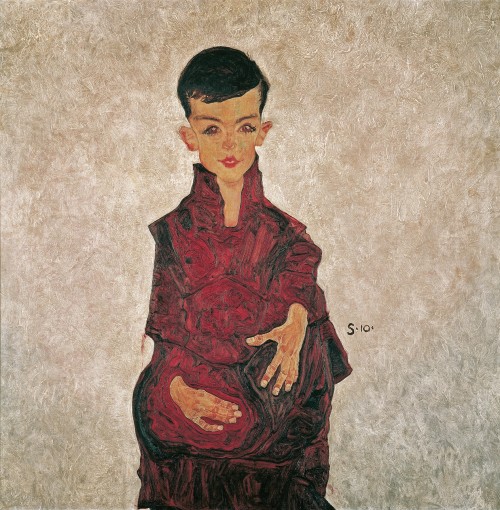You Impersonate What You Think You Are
Can you do me a favor?
Marco Giancotti,

Marco Giancotti,
Cover image:
Reinerbub (Bildnis Herbert Reiner), Egon Schiele
In Are Your Lights On?—a book I'd recommend were it not utterly consumed by a desire to be funny—authors Gause and Weinberg propose a curious notion about bureaucrats. The stereotype of a state functionary is grumpy, unhelpful, and irritable. Do they choose them like that on purpose? More likely, they become like that as they assume their roles.
The reason they behave like misanthropes, the authors write, is that they don't have the authority to help you. If you didn't bring the right number of signed copies required for your visa application, the immigration desk clerk is not allowed to accept it. It's not that they wouldn't be glad to help you, nor that they couldn't physically process the document: they must not. This turns them into the harbingers of bad news. It elects them as your official enemies. So they can't help but act as such.
When you spend enough time controlling an avatar very different from you—for example the armed protagonist of a battle video game—you're hit by the Proteus Effect, where your behavior and personality changes to be more consistent with your virtual appearance. Psychologists have found, for example, that players who were assigned taller and more attractive characters in a fantasy video game performed better at the game, and were more aggressive negotiators both within the game and, for a while, outside of it (the effect was small but consistent).
It's as if we unconsciously adapt to what we think we're supposed to be like. This aligns with Benjamin Franklin's famous hypothesis that, to win someone's favor, the best method is to ask them for a favor. From his autobiography: "He that has once done you a kindness will be more ready to do you another, than he whom you yourself have obliged."
In other words, make people feel like they're the kind of person that is generous to you, and they'll act accordingly.
There is more to the definition of self than a name, a face, and a collection of memories. You (and everyone else) are constantly observing your current state as it relates to your environment and especially to other people, and you adjust your behavior to account for it. Whenever your framing and model of the world change, so does the Tree of Possibilities you perceive for yourself. An action that was previously inhibited might become more likely. Something you'd normally do before, now looks inappropriate.
It doesn't matter if there is little or no change "in reality". When you play a video game the only thing that actually changes is which pixels lit up on a screen, and when the bureaucrat refuses to accept your papers there is no physical law preventing them. It doesn't matter, because we live in real systems, but we always act in imaginary ones. This is the Thomas Theorem:
If men define situations as real, they are real in their consequences.
It means that invisible forces, conjured by shared imagination, can sway and condition and even define us.
It also means that, often enough, changing yourself is as easy as reframing a thought. ●
Cover image:
Reinerbub (Bildnis Herbert Reiner), Egon Schiele
